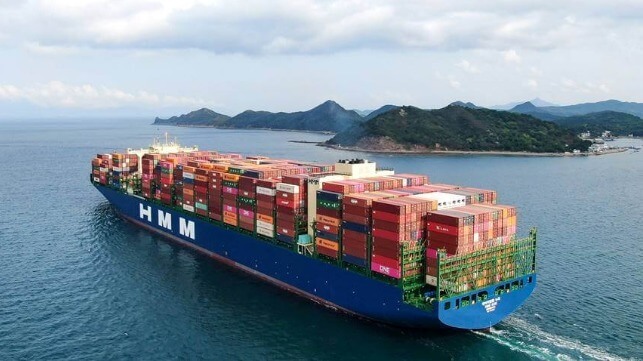HMM’s Future Uncertain After Sale Negotiations Collapse

Negotiations to complete the final sale agreement of the controlling share of Korean shipping company HMM collapsed Tuesday night after a marathon final session reportedly went down to the 12-midnight deadline. In the end, the two controlling shareholders, government-run financial institutions, and the preferred bidder, the Harim Group, reported the talks had broken down without an agreement for the $4.9 billion deal leaving the future of HMM uncertain.
Reporting the breakdown, the Korea Development Bank issued a brief joint statement saying that both sides had “negotiated in good faith,” but after seven weeks, the “negotiations ultimately broke down due to differences of opinion on some issues.”
After issuing a brief stock exchange announcement confirming that no agreement was reached, Harim, who is also the owner of the dry bulk shipping company Pan Ocean, told the Korean media the sticking point had come down to “substantive management rights.” They said that any private company will find it difficult to accept a deal where only the biggest shareholder has rights.
Harim was announced as the preferred bidder on December 18. Talks to finalize the terms began two days later and the original deadline of January 23 had been extended. February 6 was set as the final deadline for an agreement.
It had been previously reported that Harim had presented a list of conditions to the Korea Development Bank and the Korea Ocean Business Corporation, the two government entities that had been the largest creditors of HMM, formerly Hyundai Merchant Marine, since the company was overwhelmed by its debt in 2016. The two banks rescued the company before it went into bankruptcy and after a series of investments offered nearly a 58 percent stake for sale in a public auction in 2023. One of the sticking points however is that the two institutions have additional convertible perpetual bonds which represent nearly another 30 percent interest. The bonds can be converted in 2024 and 2025 and would dilute the buyer’s 58 percent stake to 39 percent.
According to reports in the Korean media, the talks broke down due to an unwillingness from KOBC to accept Harim’s terms while KDB was prepared to proceed with the sale. Among the issues was a demand that Harim and its equity partner JKL Partners hold their positions for at least five years. Harim reportedly wanted to provide JKL a potential exit proposing a three-year moratorium as well as deferring the conversion of the perpetual bonds for at least three years. In the original offering documents, KDB and KOBC indicated they would work with the buyer to set terms for the remaining bonds.
The Korea JoongAng Daily reports that KOBC was insisting on maintaining management oversight to “prevent the misuse of cash assets.” Harim reportedly objected to the financial institutions maintaining a say in the naming of management and retaining positions on the board.
The slowdown in the container shipping industry and the drop in rates are also believed to be weighing on the process. Harim reportedly had expressed concerns after Hapag-Lloyd reported it would withdraw from The Alliance, the shipping cooperation in which HMM also participates. They also reportedly questioned the impact of the EU and UK’s decision to end the antitrust exemptions for the shipping industry.
Korea’s unions issued a joint statement saying that they believed state oversight and management were necessary given the significance of HMM and the shipping industry in the country’s economy. The unions had opposed the sale to Harim questioning the company’s ability to finance the $4.9 billion acquisition and to fund HMM’s ongoing shipbuilding efforts. HMM has ordered new containerships and is also expanding its tanker, dry bulk, and heavy-lift ships. The company has also ordered its first car carriers.
A KDB official told Korean JoonAng Daily that the next steps are uncertain. They said they would be holding discussions with KOBC, but it is also being reported that Korea’s Ministry of Oceans and Fisheries is reluctant to proceed with the sale process. They are reported to be calling for “prudence” in setting the strategy.
KDB had been reported to be exploring the privatization for at least two years before launching the process in 2023. Officials of the bank have publicly questioned the use of public funds to finance the shipping company pointing out that HMM finally went profitable in 2020 after years of losses.

that matters most
Get the latest maritime news delivered to your inbox daily.
Media reports speculated that there was disappointment last year when none of Korea’s large conglomerates came forward as bidders. It ultimately came down to a head-to-head battle between two midsized groups, Harim and food and logistics company Dongwon Group. KDB and KOBC rejected an expression of interest from Hapag-Lloyd saying that ownership of HMM should remain in Korea.
